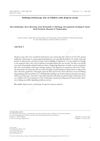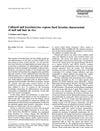 January 2023 in “Journal of Cosmetic Dermatology”
January 2023 in “Journal of Cosmetic Dermatology” Some children may develop hair loss after having COVID-19.
November 2022 in “Clinical, Cosmetic and Investigational Dermatology” The combined treatment for hair loss is effective, easy to use, and has mild side effects.
 November 2023 in “Laser therapy”
November 2023 in “Laser therapy” Trichoscopy is essential for diagnosing and managing alopecia areata in children.
 438 citations,
October 2010 in “Oncogene”
438 citations,
October 2010 in “Oncogene” Keratins help protect cells, aid in cancer diagnosis, and influence cancer behavior and treatment.
138 citations,
March 2007 in “Experimental cell research” Only a few hair-specific keratins are linked to inherited hair disorders.
69 citations,
January 2015 in “Cell & tissue research/Cell and tissue research” Keratin mutations cause skin diseases and could lead to new treatments.
 54 citations,
January 2018 in “Scientific reports”
54 citations,
January 2018 in “Scientific reports” Human hair contains diverse proteins, including keratins and histones, which could help assess hair health and aging.
 54 citations,
November 2015 in “Methods in enzymology on CD-ROM/Methods in enzymology”
54 citations,
November 2015 in “Methods in enzymology on CD-ROM/Methods in enzymology” Keratins are important for skin cell health and their problems can cause diseases.
13 citations,
January 2002 in “Biological chemistry” Different conditions affect how hair proteins assemble, and certain mutations can change their structure.
13 citations,
May 2001 in “Current problems in dermatology” Keratin proteins in epithelial cells are dynamic and crucial for cell processes and disease understanding.
9 citations,
September 2019 in “PLoS ONE” K42 and K124 keratins are only found in horse hoof lamellae.
2 citations,
February 2021 in “Journal of comparative pathology” Sheep with chronic Sarcoptes scabiei dermatitis have altered keratin expression in their skin.
1 citations,
February 2006 in “The journal of investigative dermatology/Journal of investigative dermatology” Irwin Freedberg made significant contributions to understanding keratin proteins in dermatology.
 January 2023 in “Czech Journal of Animal Science”
January 2023 in “Czech Journal of Animal Science” Proteins influence the quality and traits of cashmere goat fleece, affecting hair strength and diameter.
March 2009 in “Encyclopedia of Life Sciences” Mutations in keratin genes cause skin disorders, but new treatments show promise.
January 2007 in “The FASEB journal” Human hair keratins help nerve regeneration and support Schwann cell activity.
53 citations,
September 2004 in “American journal of medical genetics. Part C, Seminars in medical genetics” Mutations in keratin genes cause cell fragility and various skin disorders.
 16 citations,
August 1992 in “Archives of dermatological research”
16 citations,
August 1992 in “Archives of dermatological research” Lab-grown nail cells show characteristics similar to natural nail and hair.
 2 citations,
April 2018 in “Journal of Investigative Dermatology”
2 citations,
April 2018 in “Journal of Investigative Dermatology” Frontal fibrosing alopecia shows increased inflammation and JAK-STAT pathway activity without reduced hair proteins.
1 citations,
January 2021 in “Springer Proceedings in Materials” Researchers developed a new method to clearly see and label hair proteins with minimal errors using advanced freezing and microscopy techniques.
 April 2016 in “The journal of investigative dermatology/Journal of investigative dermatology”
April 2016 in “The journal of investigative dermatology/Journal of investigative dermatology” Applying the anti-cancer drug Bortezomib to skin can promote hair growth and increase hair proteins through the GATA-3 factor.
50 citations,
April 2019 in “Journal of Biosciences” 1 citations,
August 2020 in “CRC Press eBooks” Hair growth can be influenced by manipulating keratin and growth factor genes.
 30 citations,
April 2017 in “Journal of structural biology”
30 citations,
April 2017 in “Journal of structural biology” Human hair keratin fibers have a detailed nano-scale structure that changes with different conditions.
33 citations,
March 1994 in “PubMed” High ODC and low K1 and K10 may indicate early skin tumors in mice.

YH0618 helps reduce chemotherapy-induced hair loss by targeting specific proteins and pathways.
 211 citations,
April 2018 in “Cold Spring Harbor Perspectives in Biology”
211 citations,
April 2018 in “Cold Spring Harbor Perspectives in Biology” Keratins are crucial for cell structure, growth, and disease risk.
65 citations,
December 2015 in “Experimental dermatology” Corticosteroid treatment reduces inflammation and alters hair keratins in alopecia areata.
 October 2023 in “arXiv (Cornell University)”
October 2023 in “arXiv (Cornell University)” Human hair keratins might be good for filtering out harmful substances like diclofenac and PFBS from water.
 64 citations,
January 2010 in “The FASEB Journal”
64 citations,
January 2010 in “The FASEB Journal” Prolactin affects the production of different keratins in human hair, which could lead to new treatments for skin and hair disorders.














